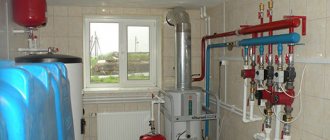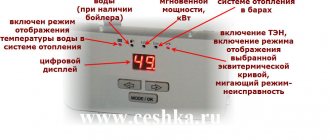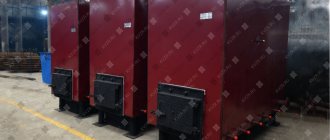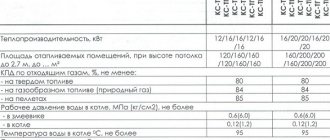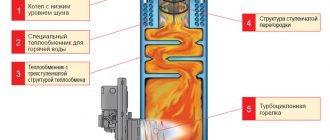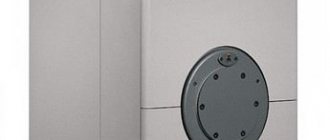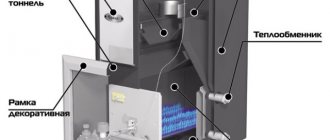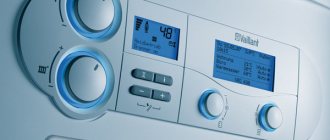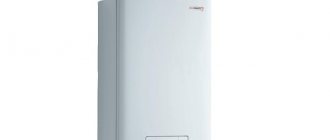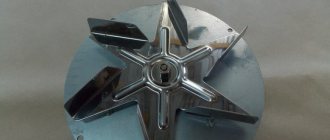A diesel heating boiler is a useful invention for country cottages, dachas and private houses. Such units are characterized by increased efficiency and at the same time operate autonomously. With proper maintenance and a stable power supply, they retain the properties declared by the manufacturer for a long time.
A diesel heating boiler is installed in country houses.
General information about diesel heating boilers
Despite the low cost of gas, connecting to centralized pipelines is accompanied by high costs. Systems running on diesel fuel are cheaper and do not require regular cleaning and the establishment of separate rooms for coal and wood.
To heat an object with an area of 100 sq. m. requires 0.8 cubic meters. m of diesel fuel for the whole season. The equipment is connected to automatic sensors and electronic units, so it does not require constant physical monitoring and manual configuration.
Functions
Modern models of liquid boilers are used for heating and organizing hot water supply in holiday villages. They make the room completely autonomous, allowing the owner to solve critical problems without access to gas lines or pipelines. When a generator is connected, the system becomes an independent source of electricity, which expands the list of its functions.
Principle of operation
Fuel mixed with air is sent into the burner reservoir, which is sprayed into the chamber using a special nozzle. The combustion efficiency of the mixture is determined by the adjustment of the device itself. After entering the chamber, the fuel is ignited by a spark, and the released energy is transferred to the coolant through the walls of the exchanger.
To regulate the heating temperature, temperature sensors installed in the combustion tank are used.
The operating principle of a diesel boiler.
Diesel boilers use both forced-air and fan-driven burners.
In the first, increased pressure is generated using a special device, which provides a high efficiency, but leads to noise during operation. Pressurized burners are equipped with a turbine, which increases the productivity of the unit.
Advantages and disadvantages of a heating boiler using diesel fuel
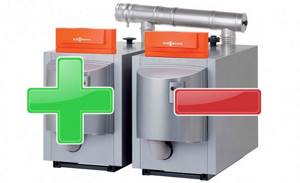
Why are diesel fuel boilers so popular? To answer this question, you need to turn to the undeniable advantages that the installation of equipment from this group provides. For example:
- Surprisingly high efficiency - only slightly inferior to gas models.
- Practicality - installation of equipment does not require obtaining appropriate permission from the fire inspectorate.
- Convenience - the boilers operate autonomously, so they do not depend on power outages.
- Assortment - equipment is presented on the market in a wide range of models, so you can choose a high-quality boiler, focusing on the area of the house and financial capabilities.
- Safety - usually several protection systems are built in that automatically interrupt the operation of the burner in the event of a malfunction.
The following are considered significant disadvantages:
- Fuel price – diesel fuel is one of the most expensive resources.
- Lack of comfort - during operation, the equipment makes noise and there is a characteristic odor.
- Additional costs - the boiler necessarily requires a separate room and fuel storage facility, where there will be a seasonal supply of fuel.
To be fair, we note that there are usually no complaints about the operation of the equipment and its efficiency. However, high additional costs often force country property owners to look for cheaper heating options.
Design features
A diesel fuel heat generator consists of several main elements. They are present in all modifications and types of similar equipment.
Boiler
The internal structure of the structure resembles a gas one. It consists of:
- Cases. It is a combustion chamber and comes in 2 types - open and closed. In the first case, air is pumped through forced ventilation, and in the second - using a pump.
- Ignition supplies. A special electronic unit that generates a spark when the fuel mixture enters the tank.
- Heat exchanger. It is a miniature radiator made of steel or cast iron. The latter remain serviceable for up to 25 years.
- Burners. In diesel installations there are blowing elements that receive air under pressure.
Automation block
Includes 2 components:
- Worker. Needed to turn the boiler on and off, as well as to maintain the coolant temperature within specified limits.
- Safety features. Automatically switches off the equipment in case of problems with traction or other problems.
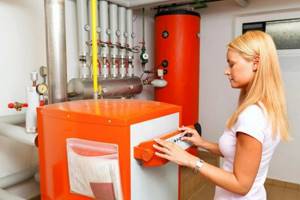
An automation unit is needed to turn the boiler on and off.
Other nodes
A fuel tank and pump are installed as additional elements. The latter ensures the supply of fuel under a pressure of 10-16 atm, promoting its atomization to a fog-like state.
Design and principle of operation of diesel boilers
The operating principle of diesel boilers has a classic equipment algorithm with direct combustion mode - the circulating coolant is heated by the heat released during fuel combustion, enters the heating system, where it releases the acquired heat and returns to the boiler for heating. The efficiency value of diesel boilers varies from 85 to 96%.
The design of diesel heating boilers is similar to the design of gas units; the main difference between the products is the burner design. The design of a diesel boiler unit includes the following main elements:
- Burner;
- The combustion chamber;
- Heat exchanger;
- Support frame with outer casing and thermal insulation layer;
- Control and security system;
- Fuel pump;
- Additional elements - circulation pump, expansion tank, safety group, secondary DHW heat exchanger (for double-circuit models).
The burner device of a diesel boiler carries out its work using a fan - it provides pressurization and sprays fuel throughout the combustion chamber through nozzles. The operation of the burner is associated with the constant availability of electricity and makes the equipment completely energy-dependent; during operation of the boiler, a constant noise level is observed. Some manufacturers make their models universal - the burners of these devices can be replaced with gas ones.
The vast majority of combustion chambers of diesel units have a closed, hermetically sealed design; atmospheric models with open fireboxes are quite rare. Smoke removal and air intake from the equipment is carried out through a coaxial chimney of the appropriate diameter.
Heat exchangers associated with the combustion chamber are made of 3 types of materials - carbon steel or stainless steel, copper and cast iron. Steel devices are the cheapest and last an average of 10–12 years (stainless ones last longer). Copper products have an excellent heat transfer coefficient, their service life varies from 15 to 18 years (on average), cast iron heat exchangers compare favorably with the duration of trouble-free operation - it usually exceeds 25 years.
Control systems for diesel boilers are characterized by a high level of automation and are usually capable of providing fully autonomous operation of the equipment; often there is a whole set of additional functions - programming modes, self-diagnosis, antifreeze, and so on.
Varieties and classification
Manufacturers of heat generators divide them into 2 groups depending on the installation method:
- Floor-standing.
- Wall-mounted.
The former are characterized by increased requirements for the quality of the fuel mixture, which is why most people choose the second option.
Taking into account the characteristics of heat generation, boilers are:
- Classic.
- Condensation.
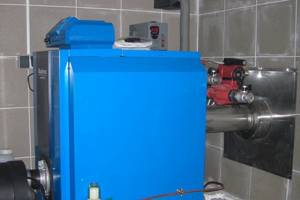
Diesel boilers are condensing.
According to the liquid heating technology, single- and double-circuit units (including those with an integrated boiler) are distinguished.
Liquid fuel boilers
Before moving on to the review of Olympia gas boilers, we will describe the advantages and features of floor-standing options that run on liquid fuel. The purpose of such equipment applies to the following objects:
- Private houses (for organizing autonomous heating).
- Public buildings.
- Industrial objects.
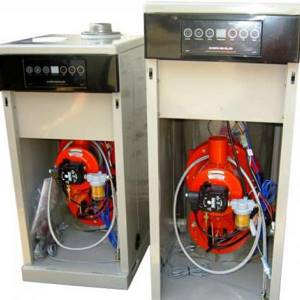
The features of Olympia double-circuit diesel boilers include the following parameters and characteristics:
- Hot water supply circuit - an indirect heating boiler is provided for DHW performance. When the tap is open, cold water is poured into the container, after which it is heated and supplied to the consumer’s needs. Moreover, hot water is obtained instantly.
- Versatility . Liquid fuel boilers from a Korean brand using diesel fuel can be easily converted to liquefied gas, which is why we decided to consider them as part of this review. To make the transfer, you just need to rearrange the burner. Due to the fact that the company produces devices designed for various fuels, the user can easily select a unit that can be combined with a specific model.
- Diesel pump. In Olympia boilers, when turned on, the device itself selects the required pressure in the fuel supply system, focusing on the density of diesel fuel.
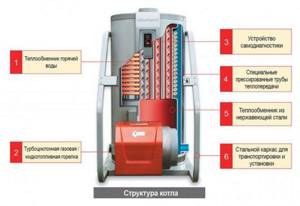
The controller immediately provides factory settings, which greatly facilitate the use of the equipment. Presets allow you to start boilers immediately after installation and connection to the heating system.
Backflow protection device: when the chimney is blocked or the fan fails, the burner turns off automatically.
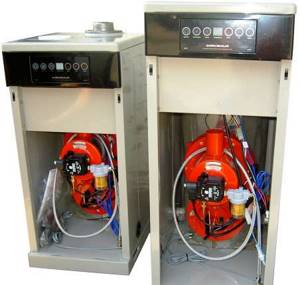
What to pay attention to
To accurately select a diesel boiler station, it is necessary to take into account the classification and characteristics of the available models.
Power
It is measured in kilowatts and indicated in the documentation. To calculate the appropriate value, it is necessary to take into account the volume of the heated object. For regions with a temperate climate, a simple formula is used: the total area of the rooms is divided by 10 to obtain the required power. In colder conditions, this figure increases by 20-30%.
Raw material consumption
Diesel fuel consumption depends on the boiler performance. Average parameters are calculated using the following formulas: power in kW is divided by 10 to obtain diesel fuel consumption in kg per 1 hour of operation in heating mode. When maintaining the temperature, the indicator decreases by 30-70%, taking into account the effectiveness of the thermal insulation of the building. The average consumption of a household unit in a small room is 0.5-0.9 kg per hour.
Heat exchanger material
In boiler installations, steel and cast iron products are found. 2 materials have both advantages and disadvantages:
- Models made of steel are inexpensive and lighter. They quickly detect temperature changes and are more tolerant of local overheating. However, the material is not protected from corrosion.
- Cast iron heat exchangers are heavier and more expensive. The material itself is fragile and can be deformed with a sharp temperature jump. But cast iron is not afraid of corrosion and has a long service life in aggressive conditions.
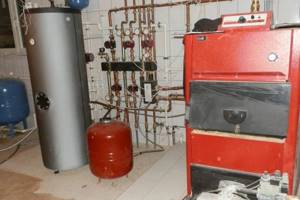
Steel products are inexpensive.
Number of circuits
Boilers for private homes can not only heat the space, but also provide hot water. Models that combine 2 functions are called dual-circuit. If it is necessary to select such equipment, the resulting calculated power should be increased by 20%.
If there is insufficient performance, the system will not be able to provide stable heating and water heating.
Heat generation method
Heating in diesel fuel boilers is carried out using 2 methods - traditional and condensation. The second option involves the use of energy from the released steam and is characterized by higher efficiency and lower fuel consumption.
How to calculate fuel consumption
The boiler power must correspond to the area of the room at the rate of 10 kW per 100 square meters.
In order to determine the approximate fuel consumption for the entire upcoming heating season, you need to carry out simple calculations using the formula:
Fuel consumption (kg/hour) = boiler power (kW)*0.1.
If the boiler power is 10 kW, then by multiplying by 0.1 we get 1 kg of diesel fuel per hour. This takes into account the boiler operating at full capacity. At such expenses, daily consumption will be 24 kg of diesel fuel.
If the heating season lasts about 200 days a year, half of this time the boiler will operate at full power, and another 100 days at half power, then we get:
(100*24) +(100*12) =3600 kg of fuel for the entire heating season.
When solids burn, they release gas, which also releases heat when burned. This is exactly the operating principle of a pyrolysis boiler. Read about industrial pyrolysis boilers here.
This calculation does not take into account many factors that significantly adjust fuel consumption: the degree of insulation of the house, the set temperature, the type of boiler (single- or double-circuit), etc.
Popular models and manufacturers
Boilers from foreign and domestic companies are on sale. Popular manufacturing plants produce dozens of models for different operating conditions.
Kiturami Turbo 13R
The heat generator is manufactured by a South Korean company and has a floor-standing configuration. Heat-resistant steel is used to make the housing, and the heat flow is pumped using a special pump.
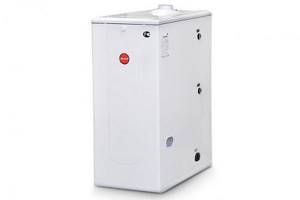
Kiturami Turbo 13R is a floor standing boiler.
To adjust operating modes, a control panel is used, which allows you to set the heating temperature and other parameters. The efficiency of the Kiturami Turbo 13R reaches 91.5%, and the consumption is 1.97 kg/h (2.25 l/h).
Navien LST-17KG
The efficiency of the Navien LST-17KG is 90%, and the fuel consumption is 1.93 kg/h (2.2 l/h). The unit has a remote control system using a room thermostat, as well as the option of programming operating settings to reduce fuel mixture consumption. The homeowner can specify a temperature reduction of up to +15°C at the time of leaving the house.
De Dietrich EFU 22 (B-Control)
The diesel boiler is manufactured by a French company and has a power of 22 kW. Its efficiency reaches 97.3%. The model operates almost silently, because equipped with a heat exchanger with 3-way gas removal and sound insulation technology. Functional elements include automatic fuel ignition and a connector for connecting a thermostat.
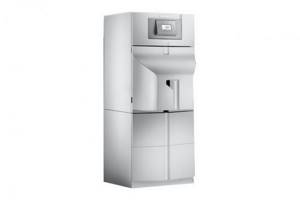
De Dietrich EFU 22 (B-Control) has a power of 22 kW.
Ferroli ATLAS 32
The Italian unit is equipped with a replaceable burner and has a power of 32 kW. Its efficiency reaches 94.3%, and the service life of the cast iron heat exchanger exceeds 25 years. The boiler has an open combustion chamber, but operates almost silently.
Lamborghini AX 3 32
A universal 1-circuit model with a power of 32 kW, which largely repeats the previous series. The boiler uses a cast iron heat exchanger with 3-level gas exhaust. The operating efficiency is 91.6%. The body has an internal thermal insulation layer.
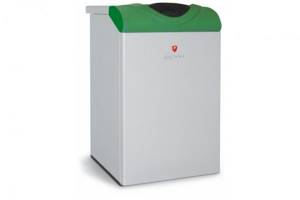
Lamborghini AX 3 32 - 1-circuit model.
Danvex B30
The heat generator is manufactured by a Finnish company and has a floor-mounted structure. Both diesel fuel and engine oil are used for operation. It is recommended to install the system in rooms up to 350 square meters. m.
The combustion chamber is equipped with smoke pipes, and processed products accumulate in the ash pan in the form of soot. The efficiency of Danvex B30 is 88%. Fuel consumption reaches 3.3 l/h.
Ferroli ATLAS 47
The boiler is equipped with a cast iron heat exchanger and can operate as an autonomous source of hot water supply. It has a thermostat to protect against overheating and automatic temperature control. Combustion power reaches 45 kW, and efficiency is 94.1%.
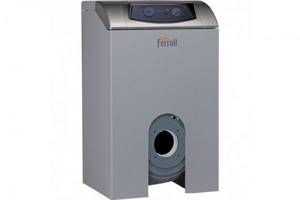
Ferroli ATLAS 47 is equipped with a cast iron heat exchanger.
Bison 50 NL
The unit from a Slovak company with a floor-mounted design operates on liquid fuel and gas. The cast iron body provides 25 years of operation. The efficiency is 89%.
The model is used in houses with an area of up to 360 square meters. m.
ACV Delta Pro S 25 26 kW
A Belgian-made floor-standing boiler is intended for installing a heating system in large cottages and industrial facilities. Its body is made of stainless steel, and can use both diesel fuel and liquefied and natural gas as fuel. The 2-circuit model weighs 145 kg and has an efficiency of 91.9% and a service life of more than 15 years.
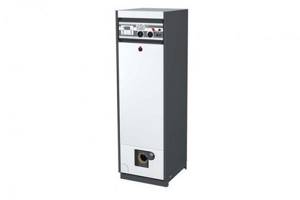
ACV Delta Pro S 25 26 kW - floor-standing boiler.
And finally
It is worth noting several aspects of the use of diesel boilers that anyone who plans to use such a system needs to know. Note that a DIY diesel heating boiler implies that only diesel fuel is used as fuel. But in recent years, such models are gradually moving away and many have already given their preference to combination boilers.
As a rule, the boiler kit includes two burners - one of them is intended for diesel fuel, the second for gas.
In such a boiler, gas is the main one, and diesel fuel is an auxiliary option. If the gas is turned off, or its pressure is so insignificant that it is not enough for the boiler to operate, then you should replace the burner and switch to heating with diesel fuel.
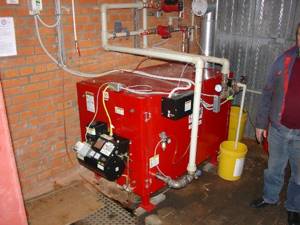
Combination boiler - can run on gas or diesel fuel
To replace the burner, you will not need to involve specialists. This work can be done by any man who is at least a little familiar with locksmith work.
Boiler room organization
It is better to install the heat generator in a separate room with good sound insulation. The area and location of the boiler room should allow the installation of a diesel fuel tank and access roads nearby.
If there is a large distance between these objects, you will need to install a pump or select a unit of increased power.
Room parameters
When arranging a technical room, the following requirements are taken into account:
- Area - from 4 sq. m for the boiler with the addition of space for a fuel tank.
- Height - from 2.2 m.
- The width of the doorway is from 0.8 m.
- Windows - from 0.3 sq. m for every 10 sq. m.
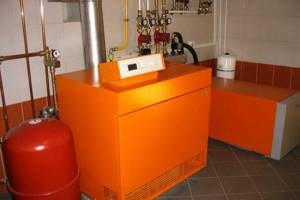
The diesel heating boiler is installed in a separate room.
The boiler body requires grounding.
Capacity for storing and supplying fuel
The reservoir can have a volume of up to 0.8 cubic meters. m. In most cases, containers made of polymer materials are used for such purposes, which are resistant to aggressive environments and are equipped with a fuel intake, a breathing valve, a float level gauge and a filter for diesel fuel.
Technical standards for installing a diesel boiler
Installation of a diesel boiler does not require special permission, but installation requires compliance with a number of rules.
- Ceilings in the boiler room must have a minimum height of 2.5 m .
- Installation in the basement is only permissible if there is a separate exit to the street.
- A unit with a power of 350 kV is allowed to be installed autonomously from a common room and away from window and door openings.
- To comply with fire safety, it is necessary to bury the fuel in the ground . This solution will save diesel fuel from low temperatures, which negatively affect the viscosity of the fuel, which puts a strain on pumping and increases energy consumption.
Organizing storage on the surface requires a container protected from sunlight. The ideal option would be stainless steel storage . To heat your home, you should purchase a container with a volume of 4 - 10 tons . Installing equipment involves additional financial costs to create a storage facility. This is the most difficult part of the installation, which determines further safety of use.
Installation and connection of the structure to the heating system
To install a diesel unit, no special permits are required. It is enough to equip a safe boiler room and a reservoir for raw materials, and also connect it to the heating system.
Since a lot of soot accumulates when the working mixture burns, it is necessary to install a jumper between the forward and reverse supply. Other stages of connecting the boiler are performed according to the same algorithm as connecting other heating systems.
It is better to place the expansion tank, safety equipment and circulation pump in the boiler room, but this is not a mandatory requirement.
Operating rules
Since diesel boilers are a source of increased danger, their use has several requirements and restrictions. For smooth and safe operation of the installation, a number of measures must be observed.
Safety
It is important to regularly check the system for diesel leaks. The first switch-on should be carried out in the presence of a professional. If you find defects in the equipment or malfunctions in the operation of the unit, you should not resort to independent repairs.
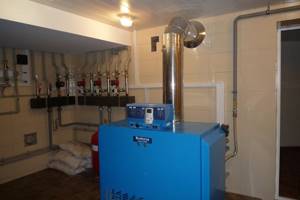
If you find any boiler defects, you do not need to fix them yourself.
It is prohibited to allow children and persons who have not undergone detailed instructions to access the boilers.
Fuel should be stored in a safe room at some distance from the residential part of the house.
Review of manufacturers
Italian-made Ferroli devices are an example of reliable, economical and safe equipment
It is also important that the products supplied to the Russian market are developed taking into account the climatic characteristics of the territory of our country
A diesel boiler for heating a Ferroli building can be called suitable for heating systems of residential buildings and cottages.
Heating devices running on diesel fuel do not depend on the ability to connect to communications.
In addition to all this, it is necessary to mention one more advantage of these boilers, namely the possibility of replacing them with a liquid fuel gas burner. What makes this model of diesel boilers universal. Thus, it will be possible to convert the heating system to gas in the future.
Disadvantages of Ferroli devices, including:
- the need to store large volumes of fuel, which specialized tanks can handle;
- you need to constantly check the fuel level so that the system does not stop working.
If we consider all products by functionality, we will notice that devices from the GN1 series provide the ability to heat rooms and heat water for domestic needs. The power of such equipment is 91 kW. But the GN2 line can only heat the air.
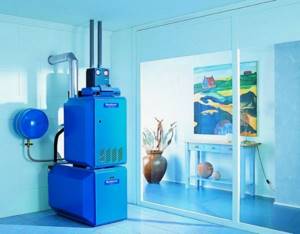
The Korean company Kiturami, which produces Turbo devices, also supplies diesel boilers to the Russian market. The products of this company combine reasonable prices and high quality. The boilers are equipped with a circulation pump, which allows the coolant to be delivered to the system much faster. Such equipment does an excellent job of heating rooms and heating water. They can be used to heat a house and heat water to a certain temperature.
The efficiency is quite high, which allows you to spend fuel more efficiently. In addition to all this, Turbo boilers are equipped with special sensors that ensure safe operation.
The heating boiler of the Turbo model, running on diesel, has a turbocyclone burner and operates with greater efficiency. KSO series devices, if necessary, can be converted to operate on a different fuel.
All units for heating systems from the Korean manufacturer are equipped with special sensors, which ensures safe operation and automatic control of the system.
Another Korean company, Navien, produces equipment suitable for heating a country house. Distinctive features of this equipment are:
- low level of noise generated;
- modern automatic control system;
- convenient equipment.
If we talk about diesel-powered boilers produced by Russian companies, it is worth saying that in most cases these are specialized models. Such equipment is characterized by low efficiency, not exceeding 70%.
Russian-made diesel boilers are assembled on the basis of designs developed back in Soviet times, namely:
- AOZhV
- Flame
- KChM
All these systems are outdated and do not meet modern requirements.
As is clear from the information above, a diesel boiler is quite economical. With its installation and subsequent operation, you can significantly save money on purchasing fuel.
However, it is worth saying that a diesel boiler with its high efficiency and low fuel consumption is suitable for large houses and detached buildings. The fact is that such equipment requires a boiler room and a fuel storage room, as well as the organization of communication between them. All this will pay for itself only if you need to heat large areas.
Heating costs
1 hour of operation of a 10 kW boiler requires 1 liter of fuel. In monetary terms, this amounts to 47-50 rubles. (average cost of 1 liter of diesel fuel). For a day of work you will need to pay 1128-1200 rubles.
How to save money
To reduce fuel costs, it is necessary to insulate the building and replace ordinary windows with double-glazed windows, equip the room with thermostats and regularly clean the boiler elements from soot. For uninterrupted operation of equipment with maximum productivity, it is necessary to operate it at peak power.
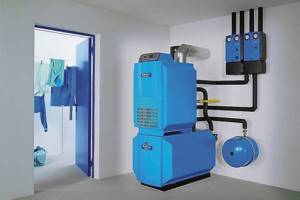
To reduce fuel consumption, it is necessary to clean the boiler regularly.
Floor
The vast majority of diesel boilers are floor-standing. This makes it possible not to look at the weight of equipment and focus primarily on durability and efficiency.
The cast iron walls of the combustion chamber and heat exchanger provide enormous survivability of the boiler. On average, you can expect 50 years of trouble-free operation without breakdowns on the boiler body, even if fuel with a high sulfur content is used.
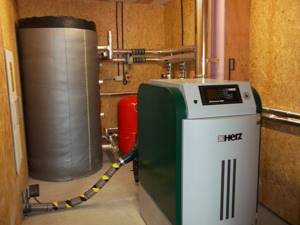
Herz boiler with boiler
Steel boiler walls, even acid-resistant alloy steel, can become leaky over time. The service life of the boiler will directly depend on the quality of the fuel and burner settings to reduce the amount of harmful emissions.
Advantages and disadvantages
Diesel units have the following features:
- Autonomy. They operate without physical control or human presence.
- Lack of inertia. This eliminates the problem of coolant boiling.
- Versatility. Can operate on machine oils.
On the negative side:
- Obtaining the highest efficiency only at maximum power.
- Danger of fuel to human life and the environment.
- High cost of diesel fuel.
- The need for power supply.
User reviews
Andrey, Moscow, 35 years old:
“I purchased a boiler 3 years ago for my dacha. The unit is small and compact, with a steel heat exchanger and an automatic unit for convenient operation settings. There were no complaints during this time. I maintain it regularly, changing filters and cleaning internal elements from soot.”
Victor, Saratov, 56 years old:
“After viewing dozens of reviews, I chose a small 17-kilowatt boiler for my dacha. I liked the quiet operation and quick heating of the room. But in severe frosts, the coaxial chimney begins to vibrate and make a lot of noise.”
Irina, 30 years old, Kirov:
“We have Kiturami at our dacha. Glad you installed it. Now you can stay outside the city even in the cold season. Fuel costs are low, and maintenance doesn’t cause any problems for my husband.”
Maintenance
A feature of boiler equipment using any fuel is the formation of soot inside the combustion chamber and chimney, the formation of scale inside the heat exchanger, clogging of injectors and fuel filter, all this not only reduces efficiency by 25-30%, but can also lead to more serious malfunctions. Therefore, regular maintenance consists solely of inspection and cleaning; it can be carried out not only by calling specialists, but also by yourself, while the warranty remains valid.
Regularity - at least once every 3-5 years; we recommend cleaning the boiler every 1-2 heating seasons and flushing the heat exchanger every 4 years.
- Cleaning and flushing the heat exchanger. When using hard, untreated water as a coolant, scale and other salt deposits form on the inner walls of the heat exchanger, which reduce its cross-section and thermal conductivity. It can be cleaned mechanically, using a solution of citric or hydrochloric acid, or without removing it from the boiler, using hydrodynamic washing. We have already described the detailed algorithm for cleaning the heat exchanger earlier; it is the same for boilers using any fuel.
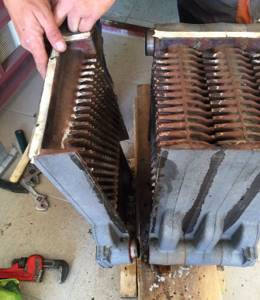
Soot and rust inside the cast iron heat exchanger sections. - Cleaning the burner, combustion chamber and external walls of the heat exchanger . During operation, soot forms on these elements, debris and dust from the room are retained; a layer of at least 0.5 cm reduces efficiency by more than 10%. The cleaning process also does not differ from analogues, with the exception of a different burner design (we also described it earlier).
- Cleaning or replacing the fuel filter . The fuel filter is not installed in many models of diesel boilers, but it is an extremely important component, since both the degree of soot formation and the service life of the boiler depend on the quality of fuel purification. And given the quality of domestic diesel fuel, fine and even coarse filters, their regular cleaning or replacement is simply a necessity.
The most common consequences of lack of regular maintenance are:
- Parasitic flame . The logic is to receive a signal from the ionization sensor about combustion before the board sends a signal to open the fuel valve / operate the injectors. To solve the problem, simply clean all burner components. Rarely, the cause may be liquid entering the electronic control board.
- The boiler smokes a lot. The classic consequence of clogged injectors: due to the absence of a fuel filter or during soot formation. In open combustion chambers, clogging can also occur due to dust in the room or repair work. To solve the problem, just remove the burner, carefully clean and blow out the nozzles.
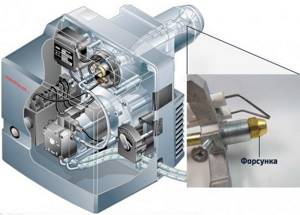
Location of the nozzle in the diesel burner.
